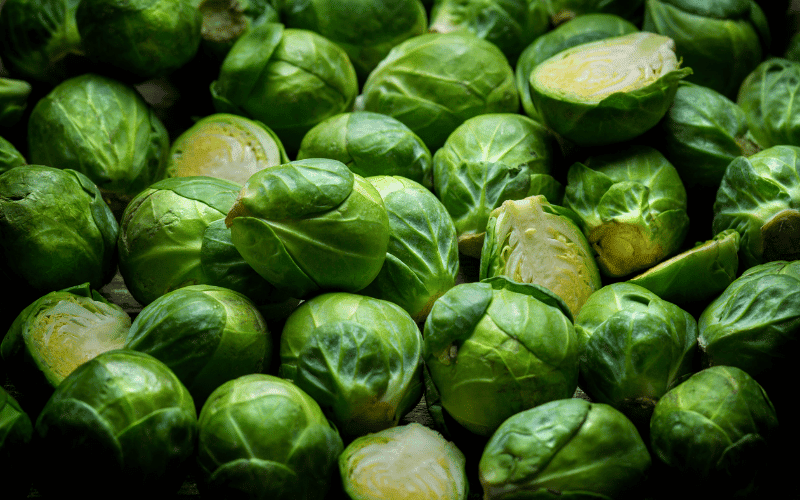Brussels Sprout Benefits: Vitamin K for Bone Health
The Unassuming Crusader of Nutrition
Let’s embark on a delectable expedition, unraveling the enigma of Brussels sprouts. Within the folds of this article, you’ll encounter a band of nutrients—unsung heroes who’ve implicitly sworn to uphold your health. We’ll unearth the symphonic harmony of vitamins and minerals that bolster bones and wrangle rogue calcium into submission.
With anecdotes as flavorful as a well-seasoned dish and a pinch of humor, you’ll discover that the verdant spheres called Brussels sprouts are not merely a side dish, but a main character in the narrative of nourishment. Prepare to be escorted through a garden of nutritional revelations, where every leaf conceals a fact, and every sprout has a story.

A Pint-Sized Nutrient Powerhouse
Let’s cut to the chase: Brussels sprouts are tiny marvels when it comes to nutritional value. The National Institutes of Health posits that a half-cup serving—that’s merely about four sprouts—can deliver over 120% of the daily value of Vitamin K. This isn’t just a trivial fact; it’s a dietary game-changer.
The Math Behind the Vitamin
To be precise, every 78 grams (which is roughly a serving) of these miniature cabbages packs a walloping 137 micrograms of Vitamin K. Now, considering an average adult needs about 90 to 120 micrograms per day, one serving of Brussels sprouts almost feels like you’ve cheated the system—in a good way!
Bone Health by the Numbers
Vitamin K isn’t just there to add a fancy letter to the vitamin alphabet. The American Bone Health institute emphasizes its critical role in synthesizing osteocalcin—a protein that, quite literally, the skeleton crew of your body needs to stay strong. In fact, without it, calcium can’t do its job. Imagine that as the equation: Vitamin K + calcium = bone health.
More Than Just K
While we’re focusing on Vitamin K, let’s not forget that Brussels sprouts are no one-trick ponies. We’re talking about respectable levels of Vitamin C, fiber, antioxidants—you name it. Each of these components plays a significant role in balancing the body’s complex health equation.
The K in Vitamin K Stands for “Koagulation?”
Believe it or not, the “K” comes from the German word “Koagulation.” And here’s the fun part: we can thank the humble, albeit tasty Brussels sprout for its impressive ability to coagulate blood. That’s right—without Vitamin K, even a papercut could turn into an epic saga.
Skeletal Strength and the Sprout
Let’s dive a little deeper into the bone brigade. The World Health Organization recommends keeping bones on their toes with adequate Vitamin K intake to guard against osteoporosis. It’s like sending reinforcements in the form of Brussels sprouts to fortify those osseous troops.
A Tiny Cabbage With a Titan’s Task
Weighing in at just about 7.9 grams each, these diminutive veggies lug around a responsibility akin to that of a Greek titan. They are tasked with no less than supporting the entire skeletal framework of humanity—one sprout at a time.
The Covert Operations of Vitamin K
Like a spy in the nutritional domain, Vitamin K operates under the radar, assisting in blood clotting and bone metabolism without fanfare or fireworks. It’s the secret agent in Brussels sprouts, sneaking health into every bite.
Brussels Sprouts: The Unlikely Hero of Hips and Thighs
Let’s give a shoutout to the hips and thighs: without Vitamin K, they wouldn’t be able to dance, jump, or kick. Brussels sprouts hand over this essential nutrient, enabling not just strength but mobility too. It both fortifies and lubricates the paths of movement.
The Crunch Equation
Here’s something to crunch on: Brussels sprouts cooked to tender perfection offer more than just a satisfying texture. Each bite delivers an algebraic symphony of nutrients that support everything from blood vessels to brain cells.
From Farm to Fork: The Vitamin K Journey
It’s a romantic tale—Brussels sprouts begin their life in the rich earth, basking in the sunshine and soaking up nutrients. By the time they make the journey to your fork, they’ve become veritable vessels of Vitamin K.
The Harmony of Nutrients
In the orchestrated universe of nutrition, Brussels sprouts bring various elements into harmony. Vitamin K plays first violin, leading charge, but the symphony includes folate, manganese, and other elements working in concert.
Keeping the Calcium in Check
Don’t underestimate the diminutive Brussels sprout; its Vitamin K content ensures calcium goes exactly where it’s needed. It’s a bouncer of sorts, showing calcium to the VIP section of the body, the bones, and keeping it out of areas where it’s not welcome, like arteries.
Tiny Veggie, Towering Taste
And if you’re wrinkling your nose, hold on just a minute. When roasted with a dash of olive oil, these sprouts go from shunned to sought-after. They bring a towering taste that even the pickiest of palates can come to admire.
Closing the Nutrient Loop
In essence, Brussels sprouts close the loop in the nutrient cycle, offering a bundle of health benefits that span far beyond simply being good for bones. They’re low in calories, high in demand, and they play a formidable role in the daily nutrition narrative.
By now, you must be seeing Brussels sprouts in a new light, a veritable lantern in the dark, illuminating the path to better health. Who knew such small packages could deliver a payload of wellness? It’s the substance of legends, or at least, the stuff of a very good meal.
